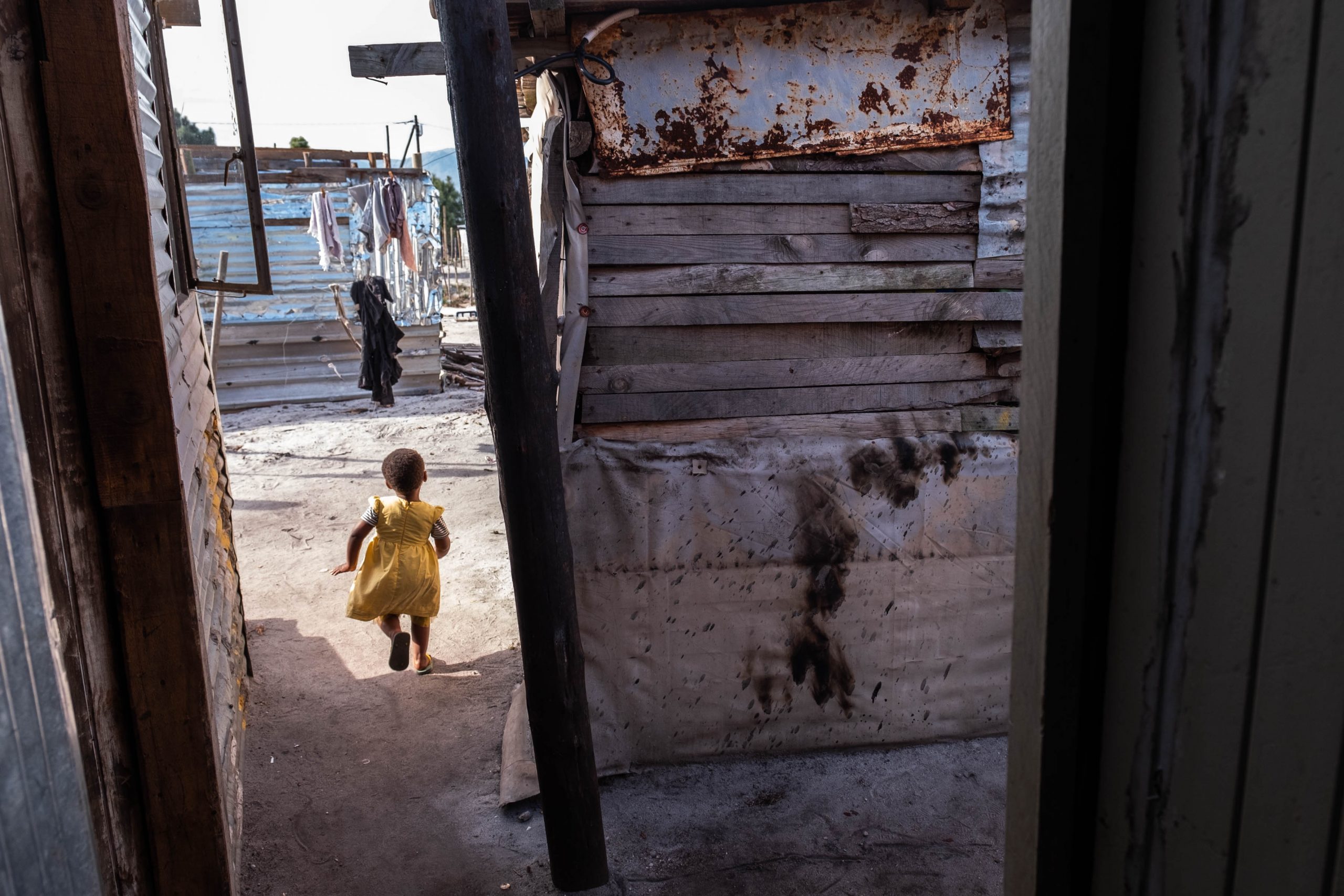Workers sacrifice basic needs hoping for R230 a day
As the strike at Oak Valley Farm drags on, workers face either total ruin as their families begin to starve or long-term destitution if they give in and take the lower wage offer.
Author:
25 June 2019

Enoch Sandile* is scared. The bulky man, with a strong frame, has been working long and hard. But as he heads toward the later years of his life, the 57-year-old can feel everything slowly slipping away. Sandile, along with other workers in his union, has been on a protected strike for close to two months against his employers at the acclaimed Oak Valley Farm in the small town of Grabouw in the Western Cape. But as the days pass by, he wonders how his family will survive the strike.
In Qumbu, in the Eastern Cape, Sandile’s wife travels 70km from her home in the village to the town of Mthatha at the end of each month. The journey takes at least an hour and a half by taxi and costs R160 for the round trip. She is epileptic and the only way she can get her medication is to travel to the clinic in Mthatha.
The money for transport comes from her husband’s salary. Sandile earns just R162 per day, which is currently in line with the national minimum wage, despite working 22 years on the farm at Oak Valley. He arrived to work on the farm in 1997, and since then, he has lived in the single-sex hostels the farm built during the apartheid era. The hostels are currently the subject of an investigation by the South African Human Rights Commission (SAHRC), because there are concerns of human rights abuses.
But, at the end of June, Sandile and his family will be in a dire situation. His wife will have to make the journey to Mthatha for her treatment, but he may not have any money to pay for her transport. Without transport, she will be unable to get her medicine.
Related article:
The workers on Oak Valley farm who have been unionised under the Commercial, Stevedoring, Agricultural and Allied Workers Union (CSAAWU) have been on strike since 6 May. The strike is protected, but the conditions include no work, no pay. Sandile, and others involved in the protest action, have not been paid since April.
“My children don’t even have food. They are asking extended family for help,” Sandile says.
Sandile works in the flower department of Oak Valley, which has a diverse business portfolio that includes fruit, wine and meat. The flowers Oak Valley produces, with the help of workers like Sandile, are sold at premium prices at large retail giants like Woolworths and Spar.
As their funding dwindles, the workers are sacrificing the allowances they send home to their families in the Eastern Cape. For those who do not live in the hostels on the farm, electricity in their shacks in the nearby townships is running out. They have scant money for food, and they feel the tension building as they wait for the union and the farm to reach an agreement.

Off-on wage negotiations
In late May, negotiations between the farm and the union deadlocked after neither side was able to reach an agreement. Now, however, the talks are back on.
Karel Swart, the CSAAWU national organising secretary, confirmed that Oak Valley had agreed to a wage increase of 6.5%. It would mean that workers who earn R162 per day would receive R173.50 per day.
Meanwhile, other unionised workers on the farm as well as non-unionised members are calling for different wages increases that are lower than what the union has asked. In the wake of the negotiations, the union has also now lowered its demand from R250 per day to R230 per day. Swart said that Oak Valley’s management were considering the new demand and would return with a response next week. The union will also prepare its response to Oak Valley’s offer of an R11 wage increase.
“We have communicated our wage offer to both our un-unionised employees [the majority at 54%] and unionised employees [46%], including CSAAWU, and await finalisation,” Oak Valley’s managing director Christopher Rawbone-Viljoen told New Frame.
But for workers like Sandile, it is the hope that they can earn up to R230 per day that keeps them going while on strike. Sandile has felt the squeeze of not earning, but he is adamant that if he can cross the threshold of earning a R230 wage, then it will be worth it.

The hostels
Sandile is part of a group of male workers who form the hostel committee that has been established for years at the farm to communicate the needs of hostel dwellers to management. Chris Nissen, the SAHRC commissioner in the Western Cape, said that conditions at the hostels were concerning.
Earlier in June, the commission handed over a list of recommendations to the farm to upgrade and improve the hostel environment for workers living there. While Oak Valley has said that only seasonal workers live in the hostel, the SAHRC has established that 11 permanent workers are among those who live there. The list of recommendations included that broken toilets be fixed, the doors to the toilets be repaired and that shower partitions be built, so the men can shower in privacy.
The SAHRC also told farm management the hostels must be converted into family units. The union has made the same demand, accusing the farm of racism because workers deemed as “coloured” live in family units while black African workers live in the men-only hostels. Nissen told New Frame that at least one black African family is living within a family unit on the farm, but that all 11 permanent workers in the hostels should have the right to live with their spouses and children.
“We are asking Oak Valley for the family units for the 11 who are permanent. We want them to actually do away with hostels. We don’t agree with hostels. But, in any case, people are living there, so let them live with dignity while they are there,” Nissen said.
Related article:
The SAHRC visited the hostels last week and confirmed that Oak Valley had begun work to improve the conditions of the buildings. The toilets have been fixed, doors have been installed and the company has agreed to build partitions for the showers, repaint the rooms and ensure that only two men share a room. Currently, four men share a small room, where there is around one-metre separating two bunk beds crammed against two walls. New Frame has not visited the hostels but has seen photos to verify this information.
Visiting hours are also to be reviewed, Nissen said. Workers are allowed to receive visitors – including their wives who travel from the Eastern Cape – only on weekends and the women and children are not allowed to stay in the hostels. The SAHRC has now told Oak Valley to stop the practice of turning the families away.
Rawbone-Viljoen has said that it is the residents in the hostels who have “a duty” to report any maintenance concerns to the management.
“Also bear in mind that the residents have a responsibility to clean up after themselves, to keep the place in a respectable condition, to report maintenance and vandalism. Damage to property is an issue we will have to address with residents going forward,” he said.
But for Sandile, nothing has changed in the hostels since 1997. The same brick walls and brick floors exist as they have always been. He says that the hostel committee has spoken to management about the poor conditions and the hostel rules for years.
“They don’t listen to us,” he says.
This year was the first time the workers went on strike.

Sacrifice, fire and fear
Sandile’s 13-year-old daughter is in Grade 6. She is the youngest of his children and every morning she uses public transport to get to school in Qumbu.
She is now enjoying her school holiday, but when July comes, Sandile will have no money left for her transport. His biggest fear is that she will have to walk the 4km to school and be vulnerable to criminal predators who watch and prey on young girls.
“I’m worried because there are tsotsis that can rape her,” he says.
In Siyanyanzela township in Grabouw, workers sit at the house of community leader Caleb Phula. Phula is part of a group of leaders in the area who are members of the Socialist Revolutionary Workers Party (SRWP). The party has been helping to organise mass support for the protesters in their communities in Grabouw. The CSAAWU has called on its members to support the SRWP.
Related article:
The workers who sit in Phula’s yard outside his shack are tired, hungry and unable to cook at home because they don’t have enough electricity. They are also worried. In the early hours of 20 June, Phula’s home was nearly engulfed in flames. A petrol bomb was thrown against his shack, sending part of the structure up in flames. His home is separated into three shacks and his 18-year-old son sleeps in the one room with the family’s electricity box. The flames lapped at the wall outside, but were put out before they reached the box and potentially exploded, with his son in the room.
Phule does not know if the petrol bomb is linked to the strike, but maintains there is a potential it is a politically motivated crime in an area where the SRWP has growing support among various other political factions, including the ANC and the DA.
For Sandile, the strike has lasted a long time. He can feel his family’s anger starting to mount, and he has already used all of his savings on his daughter’s schooling while he has been without pay. All he wants is a living wage.
“I’m scared for her because she is only a girl. I’m scared for my wife too because I have no money for her to go to hospital,” he says.
*Not his real name



